The Power to Own
Hi Everyone,
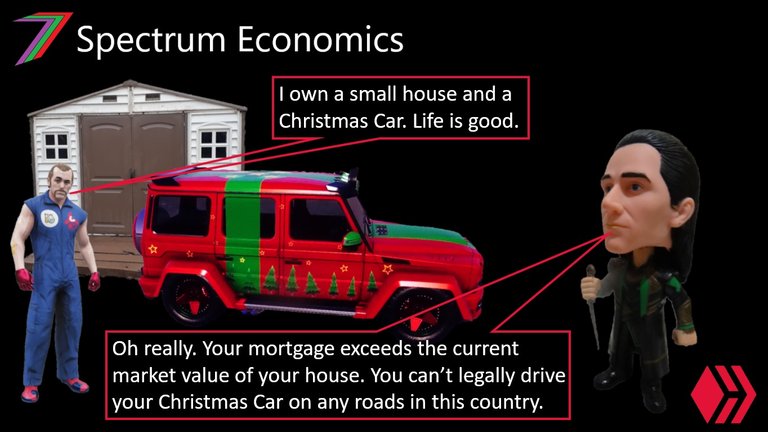
What does it mean to own something? What power does ownership give a person? What power is needed to have ownership? The World Economic Forum have become notorious for the phrase “you’ll own nothing and you’ll be happy”. It describes a world where people do not need or want ownership. Almost everything becomes a service. This is a vision/prediction for the majority of people in the world. This is not a vision/prediction for everyone in the world. Ownership will exist. Everything around you will have owners but these owners are not predicted or desired to be you. The owners will be large multinational companies, large banks, global organisations, Governments, and the elite few running them.
Below is a 2016 video from the World Economic Forum outlining 8 predictions for 2030.
The World Economic Forum’s prediction is a clear cut example of how most of us may not own anything. However, the current state of reality might not be that much different from their prediction. What is ownership? It is to own something. What does it mean to own something? According to the free dictionary and Merriam-Webster dictionary, it equates to possession and control of property. Property could refer to almost anything; it could be something small enough to carry in your hand or larger enough to build a city on.
What Do You Own?
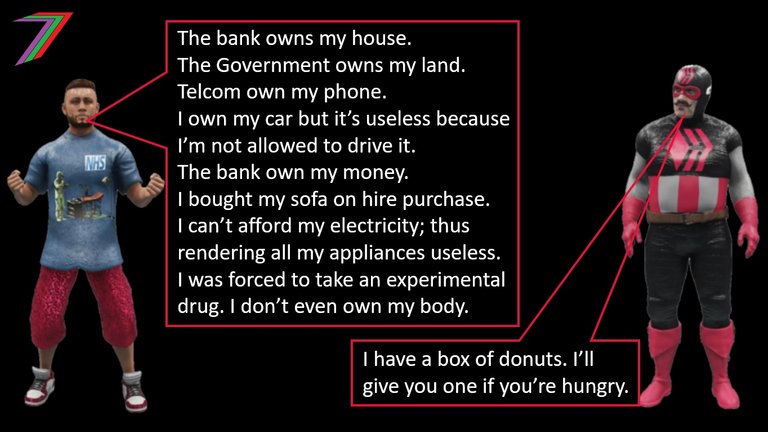
What extent do people possess and control property? Do people own the homes they live in? Do they own the land they live on? Do they own the cars they drive? Do they own the furniture in their homes? Do they own the money in their banks? Do they even own their own bodies?
Do We Own Our Homes?
A person living in house they have bought may only partly own that house. They may have a mortgage. Failure to make payments on the mortgage could result in eviction (foreclosure). Even if a person has bought a house outright or paid off their mortgage, they may still not fully own the house because they may not own the land it is built on. Even if a person has paid everything they could possibly pay to own a house in full. It could be taken from them. Governments can force people out of their homes for any number of reasons (e.g. build new infrastructure). People are required to seek permission from the Government to add permanent structures to their property or even change the colour of their home.
During the Covid-19 fiasco, some Governments even restricted the number of people or families that were permitted into a person’s home. If people do not have full control over their property, they do not have full ownership. It appears banks and Governments have a greater claim over people's homes than the people living in them. They can make rules that override those of the people who paid for the home. They also have the means to enforce these rules. When someone buys a home, they are really buying the privilege of living in the home rather than the home itself.
Do We Own Our Cars?
A person could have paid for their car outright. We could argue that they fully own their car. That person does not own the road infrastructure that the car uses. They could be blocked from accessing any road for any reason that the authority controlling the road/s sees fit (e.g. proposed changes to local road use in Canterbury (Daily Mail)). A person requires a license to operate a car. This license requires the person to pass a test. A person who has obtained a license can have their license stripped. A person could have a car that they cannot use. It is even possible they could have their car taken away from them for alleged offenses.
During the Covid-19 fiasco, some Governments placed restrictions on how far a person could travel from their home, which places limits on car usage. When a person buys a car they gain possession of it but they do not gain control over it. Instead, usage is a privilege that could be restricted or taken away.
Do We Own Our Money?
A person may physically possess money (notes and coins), which has little to no intrinsic value but has utility as a medium of exchange (i.e. intrinsically worthless notes can be traded for something that has value). It is difficult to argue that possessing something that has no intrinsic value to be real ownership. The lack of intrinsic value enables banks to create almost an infinite amount of this money at close to zero cost. Hence, creates continuous erosion of it as a store value for future usage as a medium exchange.
In most cases people do not even physically possess their money. They keep it in banks. Depositing money in banks is equivalent to loaning money to the bank. The bank both possess the money and has control over it. We could argue that people can withdraw the money in their accounts. They can pay for things directly out of their accounts through various means. This indicates an element of control over it. However, this apparent control only exists because the bank permits it.
The bank can stop people from withdrawing money or transacting. This could be through choice backed up by an excuse (e.g. suspicious activity occurring regarding transactions) or the bank may not even have sufficient liquidity to enable you to withdraw all of your money or they have may have restrictions on how much money you can withdraw or spend in one go. Some Governments even allow banks that are at risk of failure to convert debt (i.e. money in your bank account) into equity (i.e. money owned by the bank). This would complete the transfer of ownership from the account holder to the bank.
Do We Own The Gadgets and Devices in Our Homes?
There are many other things people may believe they own because it is currently in their possession but they only really partly own them. This is because they do not own the electricity that powers them. They do not own the internet or telecommunication infrastructure that they might require to fully function. If access to these resources are cut-off, the possessions people have that require power or connectivity become useless.
Do We Even Own Ourselves?
Even ownership over ourselves is becoming tenuous. During the Covid-19 fiasco, people were pressured into taking an experiment jab. If they did not take this jab, they faced many restrictions and some people even lost their jobs. Some Governments even proposed making the jab mandatory for certain groups of citizens. The Covid-19 restrictions prevented people from doing many basic things such as shopping, going out after a certain time (i.e. curfews), travelling certain distances, visiting family and friends, and even attending funerals of loved ones.
Some Governments (e.g. China) are developing or have developed social credit systems that will be used to monitor and control activity. People who score well in the system will be given preferential treatment. People who score badly could be banned from many activities (South China Morning Post). Governments are considering other initiatives that could become control mechanisms such as Digital Identification, Universal Basic Income, and Central Bank Digital Currencies.
Who are the real owners?
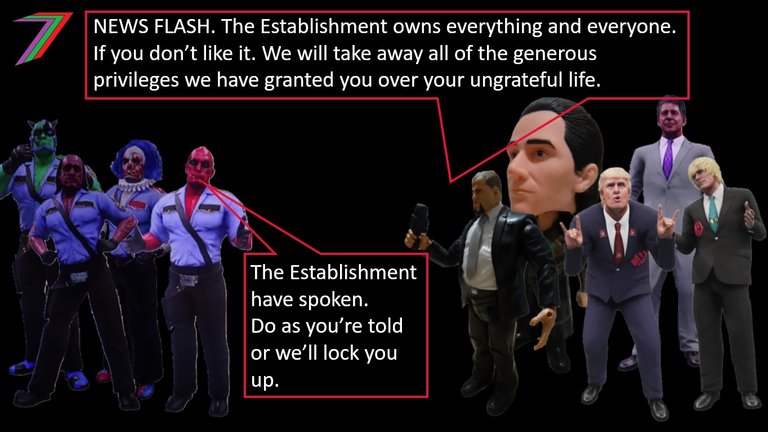
Ownership is characterised by possession and control. Most dictionaries as well as commentators will emphasis possession. However, control is the more critical part of ownership. It determines both usage and possession. Someone may possess something but if they cannot secure that possession, they do not have real ownership. The people who can take possession away are the real owners. The real owners are those who are able take and maintain possession of the property they claim to own. This could be achieved directly through violence but normally through legal or political systems which confiscates property through threats, freezing of assets, and if necessary through violence.
The confiscation of Russian national’s assets through sanctions is an example of how ownership is claimed through force rather than voluntary transactions. The loss of control over their assets occurred the moment they could no longer protect them through force (i.e. loss of legal protection). For example, Roman Abramovich owned Chelsea Football Club. When the war broke out in Ukraine, he was no longer allowed to profit from business activity of the club and was forced to sell the club and forced to forgo any of the proceeds from the sale (The Sporting News). Roman Abramovich’s wealth has dropped from US$14.5 Billion in 2021 to US$6.9 Billion in 2021 (Forbes). The sanctions (i.e. theft) played a big role in his recorded loss of wealth.
Very people few in the world have significant true ownership over property. This ownership is arguably shared and is dependent on who has the stronger claim. The strength of this claim depends on how people situate themselves within the Establishment (i.e. Government, Banks, Big Business, Religion, and Mainstream Media).
Governments’ Claim
Governments, typically led by politicians, have an enormous amount of resources at their disposal. These resources are taken from the public to justify expenditure on public services. Some of these services such as police and military can be used to physically control people. This control is essential to ensure people follow the laws and rules they enact. This is also essential to taking and maintaining ownership.
Governments are central to influencing ownership as they are able to transfer wealth between different groups using various mechanisms at their disposal. They are able to directly control people because they create the illusion of legitimacy through the political system. However, politician’s positions, especially in western countries, are tenuous as they have limited time in office and do not normally hold as much wealth as many other critical players in the Establishment. They are inclined to please the people who have the most influence on their political career. Hence, essentially, passing all the above power to these people, which includes the ability to claim ownership of property even if it is unofficial.
Mainstream Medias’ Claim
Mainstream media control public opinion and play a major part in determining which politicians are more successful at becoming and staying elected. They control the information flow and attempt to control public perception. They are able to draw attention to certain things and away from other things; thus, creating the illusion that their focus is a greater representation of reality.
Mainstream media owners may hold a more permanent position within the Establishment than politicians but are dependent on revenue streams. They need to please both sponsors and viewers. They need to promote sponsors products and/or political agendas while being able to capture the attention of the general public. This does not necessarily involve honesty.
Religious Institutions’ Claim
Religious leaders control ideology. Politicians need to please religious institutions as they can influence a large proportion of the voters. Many politicians have very close connections to the church for this reason. Religious leaders sometimes become directly involved in politics to increase the influence of their religion amongst a broader base of the population.
Some countries claim that their religious institutions are apolitical but that is close to impossible to enforce in practice. Religious institutions are able to claim ownership of property directly through donations and funding from its followers and attendees. Their revenue is often tax exempt.
Big Businesses’ Claim
Big Business owners can control Government through donations, mainstream media through advertising revenue, financial markets through economic activity, and almost everyone through the production and distribution of resources in markets with limited competition. Big Business also control a large proportion of the population through employment.
The biggest competition to big business is other big business. This competition relates more to political influence than in the markets. Governments can ensure Big Business receive large contracts, subsidies, favourable law changes, and a certain amount of monopoly power. Therefore, a good relationship with Government is essential.
Banks’ Claim
Banks (e.g. commercial and central banks) control the money supply and interest rates. They strongly influence housing markets, financial markets, exchange rates, capital flows, and economic activity in general. They have the potential to temporarily crash an economy or give it a short-term reprieve. In the short-term, they can create the impression that Government actions have been successful or disastrous, which is critical to political success because the mainstream media can ensure that only the short-term impacts are widely reported.
The power of banks has grown as they have grown larger and fewer due to mergers. Increasing national, business and personal debt increases the power and influence of decisions made by the biggest banks. This puts politicians and some Big Business at the mercy of the banks decisions. Even when the big banks encounter financial difficulties, Governments are compelled to bail them out (e.g. bail-outs or bail-ins).
Former UK Prime Minister Liz Truss served the shortest time as Prime Minister in UK history. This is likely because her policies were at odds with Bank of England (Central Bank of UK) (Politico) and her planned and eventual replacement, Rishi Sunak, worked for Goldman Sachs (Yahoo). Former Goldman Sachs employees have obtained prominent positions in Central Banks and Governments around the world (Investopedia). It is not difficult to achieve.
Rishi Sunak Example
Let us use Rishi Sunak as an example. In 2014, Rishi Sunak was selected to be the Conservative Party Candidate for Richmond Constituency. Richmond is one of the safest Conservative seats in the UK; it has been held by them for over a hundred years. Any Conservative candidate would have won. The people voted for the party and/or the party leader. I doubt many of the voters would have had any regard for the actual person running.
Two years later, Rishi Sunak supported the Brexit campaign. Members of Parliament supporting Brexit were in the minority; thus giving him greater exposure. If the Brexit campaign was successful, he positioned himself to be on the shortlist for a high position in Government. Rishi Sunak aligned himself closely with Prime Minister Theresa May by supporting all her Brexit proposals. He closely supported Boris Johnson’s policies and soon became the Chancellor of the Exchequer.
After Boris Johnson resigned, Rishi Sunak challenged to become Prime Minister but did not win the party members’ vote. This did not matter as he became Prime Minister 6 weeks later in an uncontested leadership challenge (Wikipedia).
Another advantage Rishi Sunak has is that he is of Indian origin. There has been a drive in recent decades for greater diversity and representation of minority groups in politics. Rishi Sunak fits that description well. He became the first British Indian Prime Minister.
Rishi Sunak climbed to the top of the UK political ladder without needing any endorsement by the British public.
Other Establishments’ Claim
We could argue that there is a global Establishment. This global Establishment pulls together many national Establishments. These national Establishments are not always completely in sync. The bigger Establishments have greater influence. They have the power to freeze and sometimes steal assets and even force regime change in countries that have Governments that do not follow the biggest or global Establishments instructions.
The most powerful Establishment is the US Establishment. They have secured themselves as most prominent Establishment in the world. They have biggest businesses. They have the most influential media (News and Entertainment). They have the most powerful military and control the European militaries through NATO. They have many of the biggest banks in the world. They have most the influence in western foreign policy. They have spread their influence around the world using economic sanctions, political interventions, and the establishment of military bases in many countries around the world (according to Politicio, the US have military bases in over 70 countries).
China’s Establishment is also very powerful. They dominate global manufacturing, have strong and significant access to natural resources, a competitive financial sector, and a population of over a billion people. China does not have or need the elaborate establishment structure of western countries as they do not pretend to have a western style electoral democracy. Power structure appears to form around the Chinese Communist Party. China’s Establishment has become a viable alternative to the US Establishment. This theoretically creates, by design, two opposing global economic and political blocks in a new bipolar world.
Who Has The Biggest Claim?
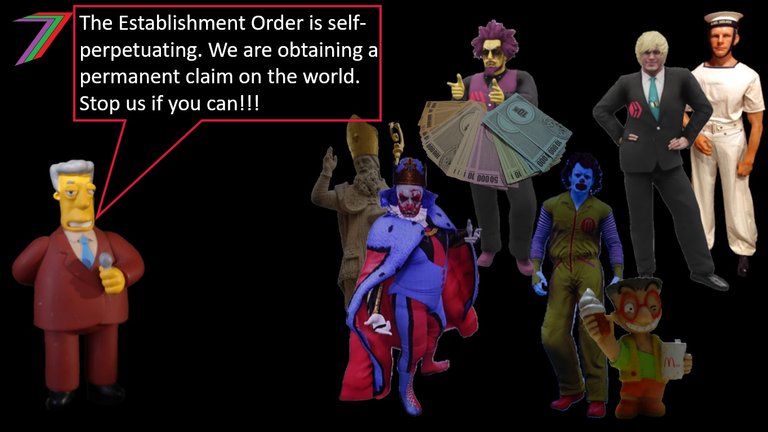
The people who have biggest claim to ownership are the people with the most power. Power is shared across National Establishments and the Global Establishment. It does not appear that any individuals or even groups of people can clearly rise above the rest. All appear dependent on each other in different ways. It is like a decentralised top or upper tier to a very centralised model. Power is lost when key dependencies are broken. This deters any group from attempting to become too powerful; when they do, they lose power instead of gain it. Therefore, the Establishment order is self-perpetuating.
The most likely weak link of the Establishment is Government. Government needs to facilitate the transfer of resources from the public to the Establishment, it needs to maintain the idea of its legitimacy, it needs to make laws that favour the Establishment but are palatable to the public, and it needs to fund the force to ensure public compliance. Purely centralised totalitarian regimes do not have the self-perpetuating system; therefore, are vulnerable to collapse as they have a single point of attack. This has been evident throughout history. Western style “democracies” do not have that weakness, which could lead to their longevity.
What Can We Do?
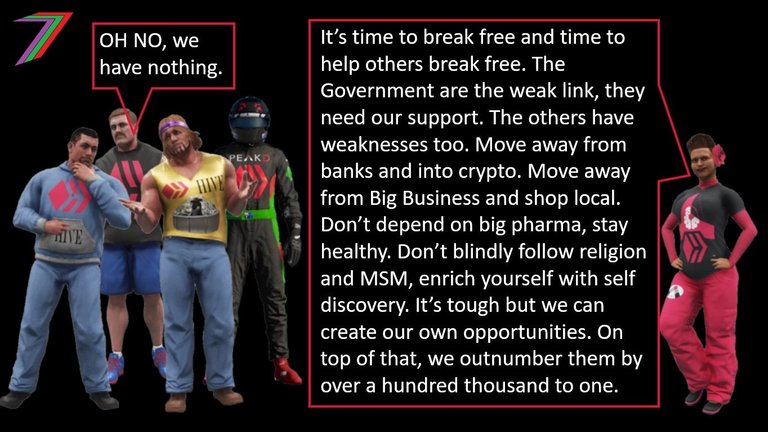
As individuals, we can disconnect from the system. We can become more self-sufficient and less dependent on Government, Big Business, Religion, and Banks. You do not have to be wealthy to have ownership of property. You just need control over it. Below are a few examples of how you can obtain more control.
- We can become self-employed.
- We can shop within our local communities.
- We can generate some or all of our own energy.
- We can grow our own food.
- We can contribute to building self-sufficient communities.
- We can switch from fiat money to decentralised cryptocurrency.
- We can focus on healthy living.
- We can aid in knowledge sharing and value adding.
The above suggestions can help but they are still not sufficient or even plausible for everyone. In the longer run, people need to work together to obtain more control.
As a collective, we can focus our energy on our Governments. They need people to support them in order to fulfil their role within the Establishment. Therefore, they need to cave to at least some public pressure; they attempt to protect themselves from public pressure through controlled opposition figures (e.g. Donald Trump). Therefore, pressure needs to be applied to the right places (I discuss possible areas of attack in my post What would get me to the ballot box?). It begins with better representation within Government so that pressure can build inside and out. It can work towards increasing decentralisation of control. It can be used to build support for protection of people’s freedom and property; thus, creating real ownership and not just the tenuous privilege of usage.
For many, the World Economic Forum prediction “you’ll own nothing and you’ll be happy” is already a reality (maybe, not the happy part). However, it has not been set in stone. People can take back power and ownership because the few only have power and ownership because the many are willingly giving it away.
More posts

If you want to read any of my other posts, you can click on the links below. These links will lead you to posts containing my collection of works. These 'Collection of Works' posts have been updated to contain links to the Hive versions of my posts.
Hive: Future of Social Media
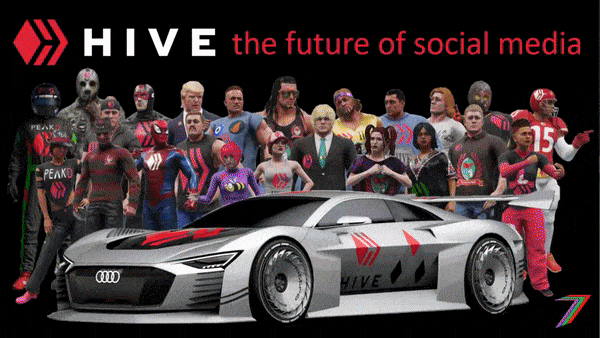
Spectrumecons on the Hive blockchain





Stunning read, this is basically to say that ownership is not truly infinite or perfect as we can suffer external restrictions even for things we have worked for. I can relate to bank stopping people from withdrawing their money even if these people reserves the right to completely use or have the money however they want or desire. However I think formal institutions are why people can never attain infinite control and even even if outrightly possess ownership, their are external factors that can act as huge limitations.
As for Rishi, a lot of people have been saying a nobody became a UK prime minister, but you've totally talked about how he's attained affluence over the years and finally hit the jackpot.
@tipu curate.
It is a power game. The few want to control the many. They want to create the impression that they are protecting people's freedom and property. This is so that people are willing to accept this arrangement. The past few years have shown that people have very little security from the powerful. Possessions and freedom can be easily taken with a few quick policy changes. Society needs to take care of itself and not be at the mercy of the few.
This show nobody truly owns anything even our so called life we don't owns according to religious beliefs, they believe God is the owner and can take it anytime, nothing we have is truly our own.
I believe what we can do is to work together and be united and that is how we can cutoff the power and the dependence
Posted Using LeoFinance Beta
Exactly, we need to work together.
Many religions use fear as a control mechanism. Disobey and you will be punished in this world or the afterlife. It works because little is known about the afterlife.
This fear doesn't work on some people, nobody knows how true it is
Posted Using LeoFinance Beta
It is a fear of the unknown. You are right, plenty of people do not fall for it but there are lots of other traps; for example, media propaganda.
A fabulous write-up as always, it really makes me think and stuff.
I think when I first questioned my ownership of things was when I watched money heist. The way the professor explained the value of things and the black market, I really understood that you don't own your money.
A small group of people can legit wake up tomorrow and convince another group that a dollar is genuinely worthless and just like that it's over.
This is the same for almost everything in life, nothing is permanent.
This life overall is just stress😂😂
Inflation is another method of taking ownership from someone. It is so easy to create inflation. Banks do it because they can continuously create money at close to zero cost. It's as simple as adding another zero to an account figure. The reason it is so easy is because money (fiat) has no intrinsic value. They couldn't make gold appear out of thin air. They couldn't make Bitcoin appear out of thin air either.
Banks for real are the real thieves😂😂
@tipu curate
Upvoted 👌 (Mana: 27/47) Liquid rewards.